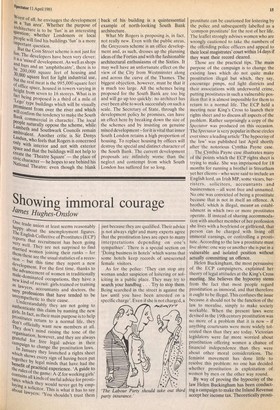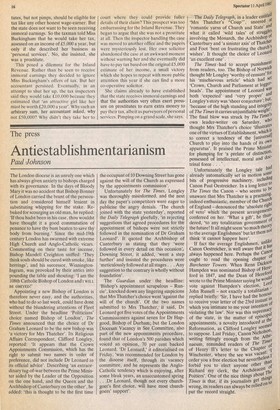howing immoral courage
James HughesOnslow
One trade union at least seems reasonably happy about the unemployment figures. The English Collective of Prostitutes (ECP) reports that recruitment has been going very Well. They are not surprised to find married women joining their ranks for them these are the usual statistics of a reces sion but this time they report a new development. For the first time, thanks to the advancement of women in traditionally Inale-dominated occupations, they have a new kind of recruit: girls trained or training as lawyers, accountants and doctors, the verY professions that have tended to be unsu 7inpathetic to their cause. Understandably they are not going to authenticate this claim by naming the new girls. In fact, as their main purpose is to help Prostitutes return to a normal life, they don't officially want new members at all. They don't mind raising the tone of the organisation, however, and they are always grateful for free legal advice in their edinpaign to change the prostitution laws. January they launched a rights sheet Which shows every sign of having been put together by legal minds that have had the benefit of practical experience. 'A guide to the rules of the game: A-Z for working girls, contains all kinds of useful advice for prosti tutest ,ntes which they would never get by einP1°Ying a solicitor. This is what it has to say about lawyers: 'You shouldn't trust them just because they are qualified. Their advice is not always right' and many experts agree that the prostitution laws are open to many interpretations depending on one's sympathies'. There is a Special section on 'Doing business in hotels' which warns that some hotels keep records of unescorted female visitors.
As for the police: 'They can stop any woman under suspicion of loitering or soliciting in a public place. They may try to search your handbag. . Try to stop them. Being searched in the street is against the law until you have been arrested on a specific charge'. Even if she is not charged, a Ale.E.tvrr-el prostitute can be cautioned for loitering by the police and subsequently labelled as a 'comtpon prostitute' for the rest of her life. The leaflet strongly advises women who are wrongly cautioned to take the numbers of the offending police officers and appeal to their local magistrates' court within 14 days if they want their record cleared.
Those are the practical tips. The main purpose of the campaign is to change the existing laws which do not quite make prostitution illegal but which, they say, encourage pimps, red light districts and their associations with underworld crime, putting prostitutes in such a vulnerable position that it is almost impossible for them to return to a normal life. The ECP held a meeting near King's Cross to launch their rights sheet and to discuss all aspects of the problem. Rather surprisingly a copy of the Spectator was produced on this occasion. The Spectator is very popular in these circles ever since a leading article 'The hypocrisy of the law' was published last April shortly after the notorious Cynthia Payne case.
The Cynthia Payne case illustrates many of the points which the ECP rights sheet is trying to make. She was imprisoned for 18 months for running a brothel in Streatham yet her clients who were said to include an English lord, an Irish MP, some vicars, barristers, solicitors, accountants and businessmen all went free and unnamed. No one was convicted of being a prostitute because that is not in itself an offence. A brothel, which is illegal, meant an establishment in which two or more prostitutes operate. If instead of sharing accommodation with another member of her profession she lives with a boyfriend or girlfriend, that person can be charged with living off immoral earnings, or controlling a prostitute. According to the law a prostitute must live alone: one way or another she is put in a vulnerable and isolated position without actually committing an offence.
Helen Buckingham, the most persuasive of the ECP campaigners, explained her theory of legal attitudes at the King's Cross meeting. She believes the hypocrisy stems from the fact that most people regard prostitution as immoral, and that therefore it ought to be illegal. This confuses the issue because it should not be the function of the law to moralise, simply to make society workable. When the present laws were devised in the 19th century prostitution was no more of a problem that it is now if anything courtesans were more widely tolerated then than they are today. Victorian legislators were far more worried about prostitution offering women a chance of financial independence than they were about other moral considerations. The feminist movement has done little to resolve this problem: no one has decided whether prostitution is exploitation of women by men or the other way round.
By way of proving the hypocrisy of the law Helen Buckingham has been conducting a campaign to make the Inland Revenue accept her income tax. Theoretically prosti tutes, but not pimps, should be eligible for tax like any other honest wage-earner. But the state does not want to be seen receiving immoral earnings. So the taxman told Miss Buckingham that he would take her tax, assessed on an income of £5,000 a year, but only if she described her business as 'personal services', No, she insisted, she was a prostitute.
This posed a dilemma for the Inland Revenue. Rather than be seen to receive immoral earnings they decided to ignore Miss Buckingham's offers of tax. But her accountant persisted. Eventually, in an attempt to shut her up, the tax inspectors said they would take £10,000 because they estimated that 'an attractive girl like her must be worth £20,000 a year'. Why such an arbitrary sum, her accountant asked, why not £50,000? Why didn't they take her to court where they could provide fuller details of their claim? This prospect was too embarrassing for the Inland Revenue. They began to argue that she was not a prostitute at all. Then the inspector handling the case was moved to another office and the papers were mysteriously lost. Her own solicitor abandoned the case at an awkward moment without warning her and she eventually did have to pay tax based on the original £5,000 estimate of her income, a small victory which she hopes to repeat with more public attention this year if she can find a more co-operative solicitor.
She claims already to have established that the state receives immoral earnings and that the authorities very often exert pressure on prostitutes to earn extra money to pay their tax, albeit as purveyors of personal services. Pimping on a grand scale, she says.











































 Previous page
Previous page